Содержание
- 2. American writer and humorist Mark Twain demonstrated an uncanny understanding of childhood and human nature, often
- 3. 1835-1910 In order to make anything out of himself, Mark Twain had to struggle with his
- 4. Basic Facts The basic facts of Twain's life are well known. Four years after he was
- 5. Basic Facts He followed his trade over a good part of the country, working in towns
- 6. Basic Facts After piloting steamers for about four years, Clemens retired to the Nevada gold country,
- 7. Success And Marriage In 1869 he published The Innocents Abroad, an account of a trip to
- 8. Success And Marriage As a successful writer he attained respectability enough to marry into a wealthy
- 9. Mark Twain wrote the classic story The Adventures of Tom Sawyer in 1876 about a boy’s
- 10. American writer Mark Twain lived from 1874 to 1891 in a 19-room house built for him
- 11. Huck Finn In 1876 he sat down to its sequel, The Adventures of Huckleberry Finn. Although
- 12. Huck Finn Between 1876 and 1885 Twain had written several books, among them The Prince and
- 13. Sorrows And Difficulties Mark Twain's final years were not full of the satisfactions a man hopes
- 14. Sorrows And Difficulties These were deeper losses, more personal than merely financial misfortunes. First, his daughter
- 15. Sorrows And Difficulties Disillusioned by business reversals and personal losses, he was a bitter writer toward
- 16. Sorrows And Difficulties His writings, from the earliest to those just appearing, can best be described
- 17. "All you need is ignorance and confidence; then success is sure."
- 18. His Influence Successive generations of writers, however, recognized the role that Twain played in creating a
- 19. Do you know? Mark Twain, the pseudonym used by Samuel Langhorne Clemens, first appeared on February
- 20. Do you know? On the Mississippi River, “mark twain” meant “two fathoms deep.” Twain received an
- 21. "Every one is a moon, and has a dark side which he never shows to anybody."
- 22. "The man who does not read good books has no advantage over the man who can't
- 23. Mark Twain National Forest is the only national forest in the state of Missouri. It is
- 24. The Adventures of Huckleberry Finn
- 26. Summary: American literary critic Lionel Trilling called Mark Twain’s Adventures of Huckleberry Finn (1884) “one of
- 27. When they reach the shore, the duke turns in Jim for a reward offered for a
- 29. Chapter XXXI We dasn't stop again at any town, for days and days; kept right along
- 30. First they done a lecture on temperance; but they didn't make enough for them both to
- 31. They tackled missionarying, and mesmerizering, and doctoring, and telling fortunes, and a little of everything; but
- 32. And at last they took a change, and begun to lay their heads together in the
- 33. So then we was pretty scared, and made up an agreement that we wouldn't have nothing
- 34. Well, early one morning we hid the raft in a good safe place about two mile
- 35. So we staid where we was. The duke he fretted and sweated around, and was in
- 36. So me and the duke went up to the village, and hunted around there for the
- 37. The duke he begun to abuse him for an old fool, and the king begun to
- 38. "Set her loose, Jim, we're all right, now!" But there warn't no answer, and nobody come
- 39. "Wherebouts?" says I. "Down to Silas Phelps's place, two mile below here. He's a runaway nigger,
- 41. "It was an old fellow—a stranger—and he sold out his chance in him for forty dollars,
- 42. I didn't have none, so he left. I went to the raft, and set down in
- 43. Once I said to myself it would be a thousand times better for Jim to be
- 44. And then think of me! It would get all around, that Huck Finn helped a nigger
- 45. The more I studied about this, the more my conscience went to grinding me, and the
- 46. Well, I tried the best I could to kinder soften it up somehow for myself, by
- 47. It made me shiver. And I about made up my mind to pray; and see if
- 48. So I was full of trouble, full as I could be; and didn't know what to
- 49. I felt good and all washed clean of sin for the first time I had ever
- 51. But somehow I couldn't seem to strike no places to harden me against him, but only
- 52. It was a close place. I took it up, and held it in my hand. I
- 53. It was awful thoughts, and awful words, but they was said. And I let them stay
- 55. Huck Finn" And The Picaresque The story of Huck Finn's adventurous journey down the Mississippi River
- 56. Huck Finn" And The Picaresque: In addition to having an episodic plot, picaresque novels have as
- 58. the picaresque novel There is no doubt that Mark Twain borrowed from the traditions of the
- 59. the picaresque novel The story was begun in 1876, but not completed until 1884 when it
- 62. Shifts Of Viewpoint So he laid it aside for a while. But notice how the first
- 63. Shifts Of Viewpoint This shifting around would be a major flaw in the novel if Jim
- 65. Contrast The story is full of striking comparisons, many of which are pointed out in the
- 66. Contrast There is also an obvious contrast in the character of Tom Sawyer and that of
- 67. Contrast The preoccupation with justice has him on the horns of a dilemma. Whatever he chooses
- 71. Huck And Jim He learns from Jim, who is in some ways his substitute father. He
- 73. Second Part In the second part of the story - the chapters dealing with the Grangerford
- 75. Second Part The Grangerfords, with their senseless pride and basic crudity, are held up as examples
- 76. Second Part The king and the duke are illustrations of Tom Sawyer's desire to "promote" things
- 78. Third Part Finally, the third part of the novel brings us back to Tom Sawyer as
- 80. Third Part We see Tom as he is, a romantic, a muddlehead, but bound to be
- 82. The Realist We also see Huck as he is, the opposite of Tom. He is a
- 83. The Realist So far as the mechanics of composition are concerned, Mark Twain was considerably limited
- 84. The Realist Very obvious is the fact that the humor of the book often depends on
- 88. Dialects So far as the dialects of the characters are concerned, we can only remark that
- 89. The Main Characters
- 90. Huckleberry Finn This is the central figure of the novel, the son of the town drunkard.
- 91. Huck is essentially a realist. He knows only what he sees and experiences. He doesn't have
- 92. The Widow Douglas The wife of the late Justice of the Peace of St. Petersburg -
- 93. Miss Watson The Widow's maiden sister. She leads Huck to wish he were dead on several
- 94. Tom Sawyer Huck's friend. A boy with a wild imagination who likes to play "games." He
- 95. Jim Miss Watson's slave, and the one really significant human character Huck meets in the novel.
- 96. Pap Huck's father, the town-drunkard. He is in every respect the opposite of Jim. He is
- 97. Judge Thatcher The guardian of Tom's and Huck's money. He is very wealthy, and the most
- 98. The Grangerford Family Southern aristocrats of the pre-Civil War south. They are portrayed as men who
- 99. The King And The Duke Two river tramps and con-men who pass themselves off to Huck
- 100. The Wilks Girls Nieces of Peter Wilks, a dead man. The king and the duke try
- 101. The Phelpses Tom Sawyer's uncle and aunt. They buy Jim from the king and the duke.
- 102. Aunt Polly and Sid Aunt Polly: The aunt with whom Tom lives. She is fairly well
- 105. Скачать презентацию



















































































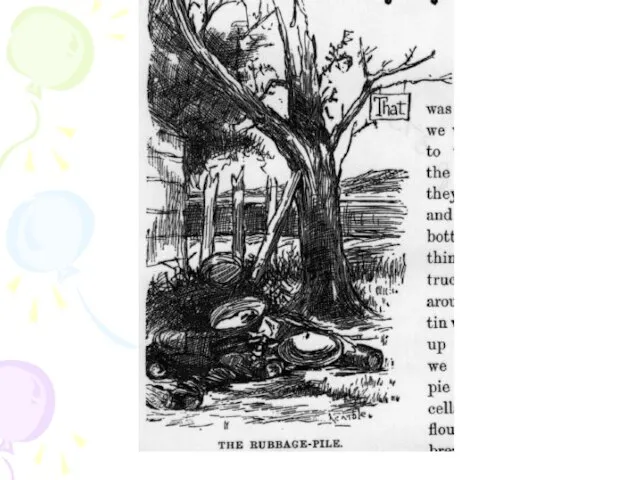

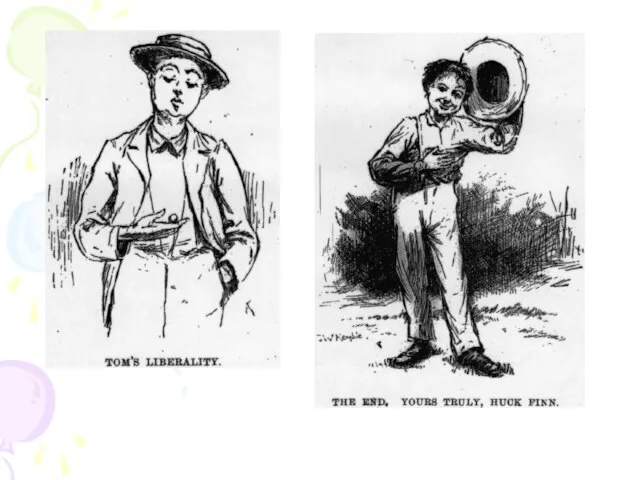




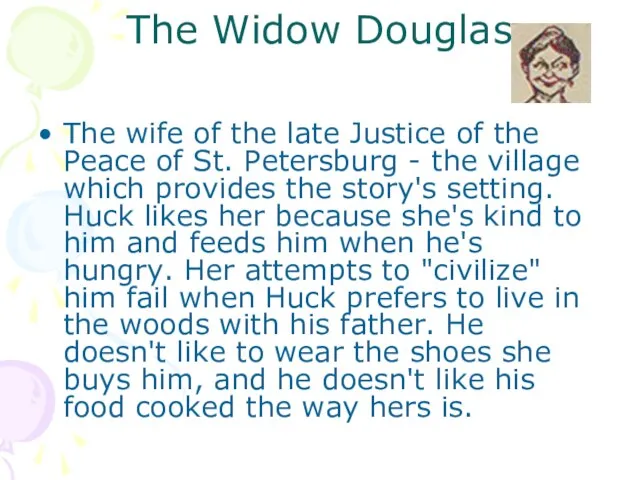
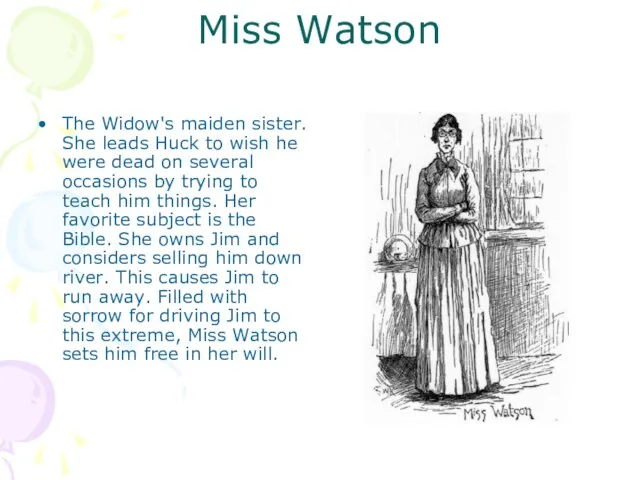

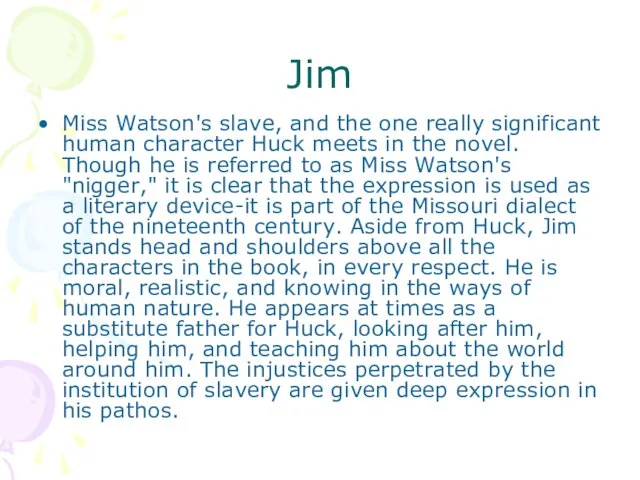
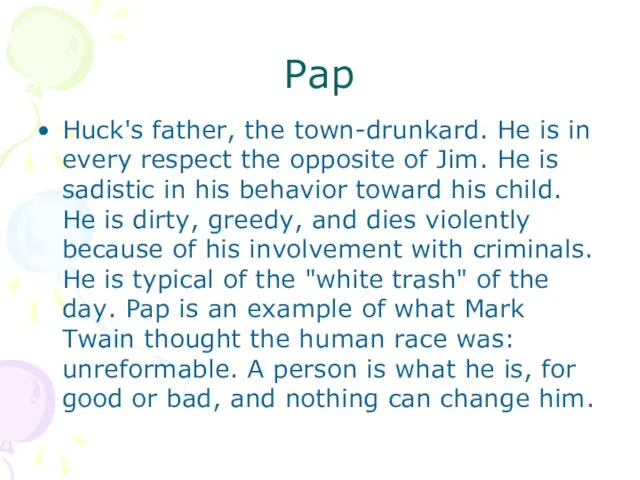
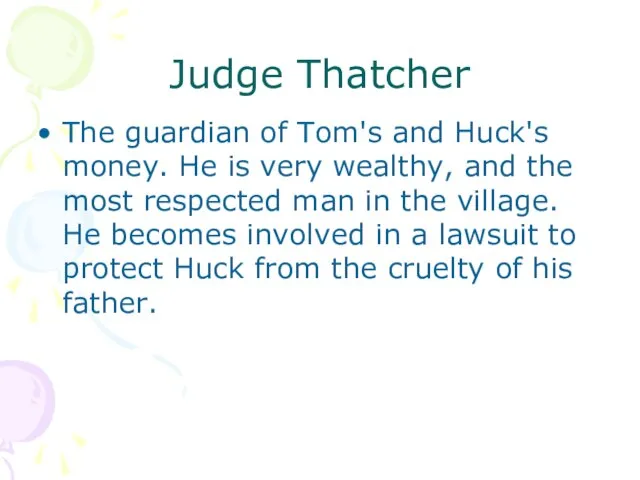

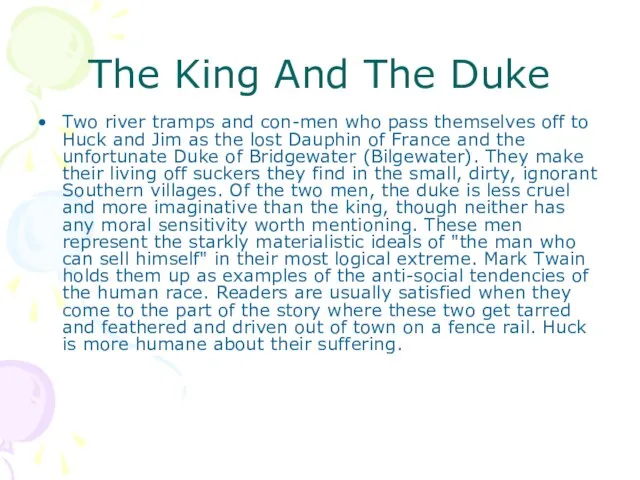

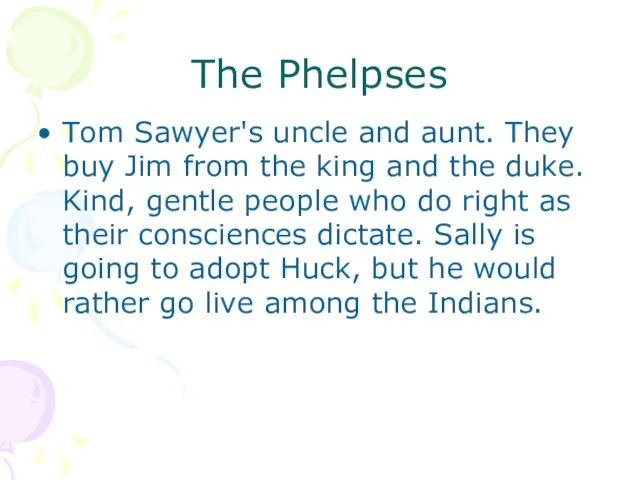
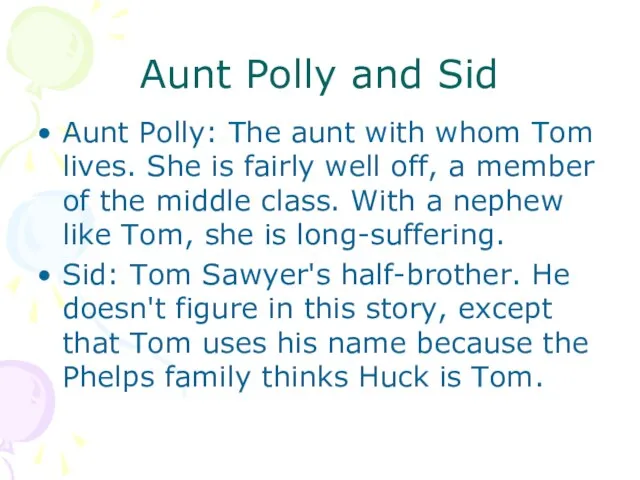
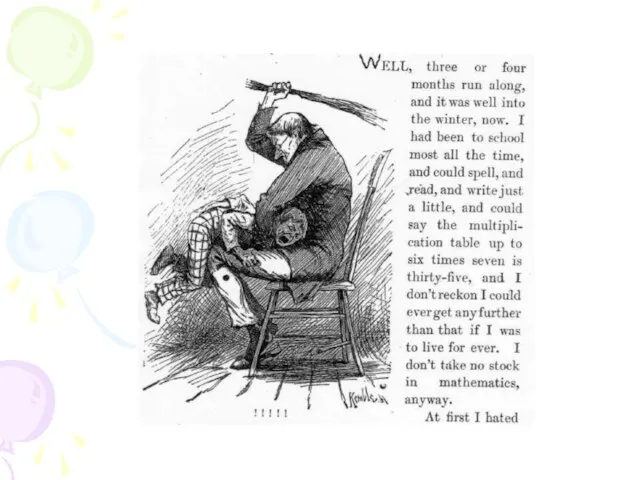
 Лучший способ сделать детей хорошими – это сделать их счастливыми
Лучший способ сделать детей хорошими – это сделать их счастливыми Презентация на тему Cилы и средства ликвидации чрезвычайных ситуаций
Презентация на тему Cилы и средства ликвидации чрезвычайных ситуаций  Мудрые советы Лао Цзюня
Мудрые советы Лао Цзюня Новые функциональные возможности «1С:Управление торговлей 8» для решения оперативных задач специалистами торговых предприятий
Новые функциональные возможности «1С:Управление торговлей 8» для решения оперативных задач специалистами торговых предприятий ЧТО ТАКОЕ IELTS? www.studybady.comwww.studybady.com – полезная информация об обучении в Великобритании и получении студенческой визы www.studybady.comwww.studyba
ЧТО ТАКОЕ IELTS? www.studybady.comwww.studybady.com – полезная информация об обучении в Великобритании и получении студенческой визы www.studybady.comwww.studyba Наш друг компьютер
Наш друг компьютер Комплекс упражнений утренней гимнастики (1 класс)
Комплекс упражнений утренней гимнастики (1 класс) Личность и политик
Личность и политик «Времена не выбирают: в них живут и умирают…»
«Времена не выбирают: в них живут и умирают…» Целевой проектСпособный ребёнок
Целевой проектСпособный ребёнок Introduction to Management
Introduction to Management 23.04. uneployment
23.04. uneployment Е. Поплянова «Начинается урок»
Е. Поплянова «Начинается урок» Презентация на тему Роль учителя в современной школе
Презентация на тему Роль учителя в современной школе  Саргатская культурно- историческая общность
Саргатская культурно- историческая общность Гимнастика
Гимнастика портфолио воспитателя
портфолио воспитателя Национальные символы России
Национальные символы России Рейтинг застройщиков
Рейтинг застройщиков Буддизм
Буддизм Лаборатория 711, 713, 715. Планы. Долги
Лаборатория 711, 713, 715. Планы. Долги Презентация на тему Вторая война Рима с Карфагеном
Презентация на тему Вторая война Рима с Карфагеном  Ассортимент
Ассортимент Урок развития речи в 7 классеКомплексный анализ текста ”Памятник подлецу”
Урок развития речи в 7 классеКомплексный анализ текста ”Памятник подлецу” В стране веселого детства
В стране веселого детства Презентация на тему Наука и образование в Древней Греции
Презентация на тему Наука и образование в Древней Греции Роль имени прилагательного в речи.
Роль имени прилагательного в речи. Где обитают знаки препинания?
Где обитают знаки препинания?